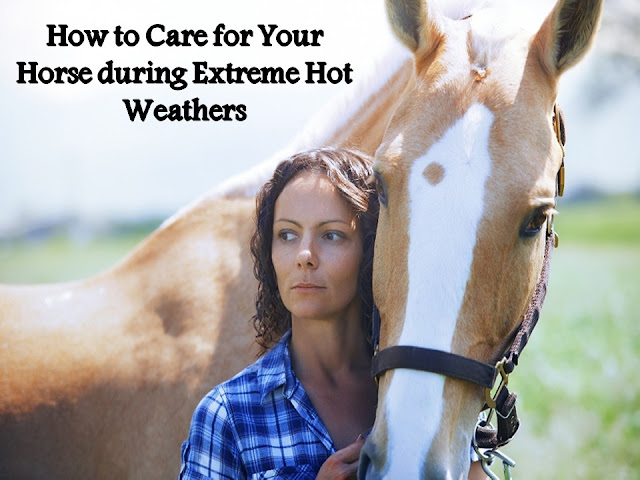weather poses an increased risk for horses as like sustaining infectious
diseases to dehydration. It is essential to ensure extra care to your horses
during hot weather conditions to keep them healthy and active. Quick tips are:
- Provide enough shade and ensure
adequate airflow. - Ensure free access to clean water.
- Avoid riding much.
- Sponge the body with cool water
and instantly scrape it off. - Try and reduce stress.
- Consult a veterinarian in case if there
are symptoms of a heat stroke.
your horse is exposed to extreme heat for an elongated period, it may result in
problems like:
- Heat stroke
- Heat stress
- Dehydration
- Muscle cramping
- Colic.
- Diseases like Potomac Horse Fever
or West Nile Virus etc.
Causes
of overheating:
may result not only from hot weather, but even when your horse is exposed to
high humidity, poorly ventilated barn, prolonged exposure to sun, overwork,
improper transportation, being excessively obese, etc.
say that summer is the time when body heating related issues are on the peak at
horses. Here are some tips to keep your horse cooler and more comfortable
during such seasons.
Ensure
free access to water:
summer, offer you horse unlimited access to cool and clean water. An adult
horse may need about 7 to 10 gallons of plain water daily. They may drink even
more during hot working conditions. So, it is essential to allow your horse to
take in a few gulps of fresh water every few minutes to reduce the adverse
impact of heat.
is also important to clean the buckets and tanks to fill water frequently
during hot weather. This is to prevent the formation of algae and bacteria. In
case of slow running streams and small ponds, blue algae toxicity is so common
during hotter months and dry weather. Thus, proper cleaning is also critical in
terms of ensuring horse health.
Reduce
the ride time and ride intensity:
stress may already on the horses, which is more intense on older and obese
horses. However, in the case of young foals also, it is ideal to avoid
intensive riding or for the extended time period, which may end up in
dehydration or heat strokes. Also, avoid riding completely if the combined
temperature, as well as relative humidity, go beyond 150. If it is unavoidable
to rid during hot, humid weather, then note the following points:
- Adjust the riding schedules
accordingly, early morning and late evening preferably. - Keep work to a minimum and also
ensure frequent breaks to allow the horse to cool down. - Stop if the breathing rate of the
horse gets elevated. - Watch for any abnormal sweating.
- Work the horse in the shade as far
as possible and create adequate airflow also by using fans. - Give access to water frequently
while at work.
is also important to call for a veterinarian in case if you notice the horse
stop to produce sweat or breathes heavily. Lethargy, distress, and
non-coordination also may be adverse effects of heat, and all these require
immediate care by a veterinarian in order to not worsen further. Visit TVG to know more.



